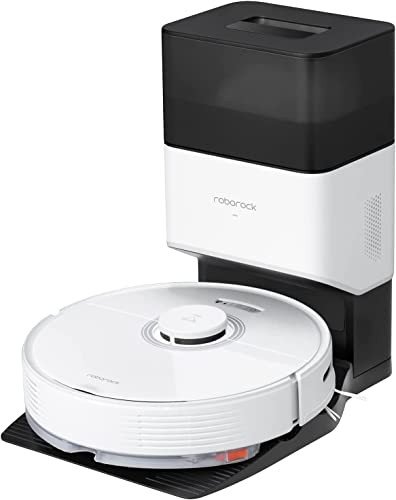The Main Problem With Autonomous Vacuum And How To Fix It

The Rise of Autonomous Vacuums: Revolutionizing Home Cleaning
In the age of technology, household tasks are becoming increasingly automated, and among the most significant improvements in this world is the autonomous vacuum. These smart cleaning robots are created to reduce the drudgery of conventional vacuuming, making them popular among time-strapped homes. This article explores the advancement, performance, benefits, and limitations of autonomous vacuums, in addition to a contrast of some of the leading models on the marketplace today.
What is an Autonomous Vacuum?
An autonomous vacuum, likewise referred to as a robotic vacuum cleaner, is a little, automated device that browses through your home to clean floorings without human intervention. Geared up with sensors, cams, and advanced software, these vacuums can identify obstacles, avoid stairs, and enhance cleaning paths. robot that mops and vacuums run from a rechargeable battery, going back to their charging stations when their power is low or when cleaning jobs are finished.
Secret Features of Autonomous Vacuums
Smart Navigation:
- Utilizes sensing units and algorithms to map the environment.
- Can browse complicated designs and avoid obstacles.
Scheduling:
- Allows users to set cleaning times.
- Can operate when the home is empty, making sure minimal interruption.
Connectivity:
- Many designs connect to Wi-Fi, enabling app control and integration with clever home systems.
- Users can personalize settings, check cleaning status, and receive alerts through mobile applications.
Suction Power:
- Varies in between designs; some deal adjustable suction settings for different floor types.
- High-end designs feature powerful suction efficient in getting pet hair and deep dirt.
Floor Type Adaptability:
- Capable of cleaning carpets, hardwood, tiles, and more.
- Certain models focus on tailored cleaning for several surfaces.
The Advantages of Using Autonomous Vacuums
1. Time-Saving
Among the most considerable advantages of autonomous vacuums is the quantity of time they save. Rather than investing hours pressing a conventional vacuum, house owners can set robotic vacuums to tidy while they are engaged in other activities.
2. Consistent Cleaning Schedule
With the capability to arrange cleansings, these vacuums guarantee that spaces are routinely cleaned, leading to a cleaner home overall. Regular cleaning helps preserve indoor air quality, specifically for families with allergic reactions or asthma.
3. Smart Home Integration
Numerous autonomous vacuums can be integrated with wise home systems for smooth operation. Property owners can control their vacuums by means of voice commands through gadgets like Amazon Alexa or Google Assistant, improving user benefit.
4. Compact Design
The slim profile of these gadgets permits them to clean up under furnishings, such as sofas and beds, where traditional vacuums often can not reach.
5. Pet-Friendly
For pet owners, autonomous vacuums can be a game-changer, as they are often equipped with specialized features for choosing up pet hair and dander, contributing to a cleaner home environment.
Limitations of Autonomous Vacuums
Despite their lots of advantages, autonomous vacuums likewise have constraints:
1. Minimal Deep Cleaning
While these vacuums effectively keep tidiness, they may not change the efficiency of a deep tidy supplied by conventional vacuums, particularly for greatly soiled locations.
2. Capacity Constraints
Most autonomous vacuums come with little dust bins that require to be cleared regularly, especially in bigger homes or homes with family pets. robot that mops and vacuums can be a hassle for some users.
3. Navigation Challenges
Although navigation innovation is continually improving, some designs might battle with particular designs, especially complicated areas with many barriers or really small rooms.
4. Cost Point
While costs have actually ended up being more available, high-end designs can still be quite costly, posturing a barrier for some consumers.
Contrast of Top Autonomous Vacuum Models
| Model | Smart Features | Battery Life | Suction Strength | Cost Range |
|---|---|---|---|---|
| iRobot Roomba 980 | App Control, Voice Assistant | 120 minutes | 1700 Pa | ₤ 700 - ₤ 900 |
| Roborock S6 MaxV | Advanced Mapping, Connectable | 180 minutes | 2500 Pa | ₤ 600 - ₤ 800 |
| Ecovacs Deebot Ozmo | Mopping, Smart Home | 110 minutes | 1500 Pa | ₤ 450 - ₤ 700 |
| Neato Botvac D7 | Laser Navigation, Custom Zones | 120 minutes | 2000 Pa | ₤ 800 - ₤ 900 |
| Shark IQ Robot | Self-Emptying Base, Smart Map | 90 minutes | 1500 Pa | ₤ 400 - ₤ 600 |
Notable Takeaways
- Smart Features: Consumers must prioritize designs using robust smart features for benefit and efficiency.
- Battery Life: A longer battery life is advantageous for larger home.
- Suction Strength: Depending on home needs, varying suction power can considerably affect cleaning efficiency.
Frequently Asked Questions about Autonomous Vacuums
Q1: How do I preserve my autonomous vacuum?
A: Regular upkeep includes cleaning the brushes, clearing the dustbin, and looking for blockages. Furthermore, keeping the sensing units clean up will assist keep navigation precision.
Q2: Can robotic vacuums tidy carpets and carpets?
A: Yes, numerous robotic vacuums are developed to effectively tidy both difficult surface areas and carpets. However, suction power might vary based upon the model.
Q3: Do robotic vacuums need Wi-Fi?
A: While many autonomous vacuums benefit from Wi-Fi connectivity for app control and updates, some models can run independently without a wireless connection.
Q4: How typically should I run my robotic vacuum?
A: It depends on your living situation, however running it several times a week is typically suggested, particularly for homes with animals.
In conclusion, autonomous vacuums represent a substantial advancement in home cleaning innovation, promising convenience and efficiency. While these devices might not entirely replace standard vacuum cleaners, they are certainly helpful in maintaining a clean living environment. As innovation continues to evolve, the future of home cleaning looks appealing, and these devices are at the forefront of the transformation.

